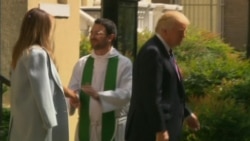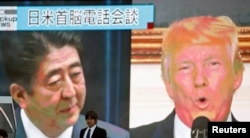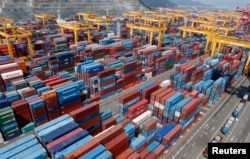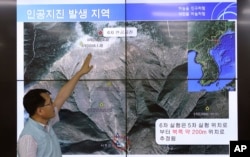U.S. President Donald Trump condemned North Korea on Sunday for carrying out its largest nuclear test yet, calling it "a rogue nation" whose "words and actions continue to be very hostile and dangerous to the United States."
In a pair of Twitter comments, the U.S. leader said North Korea "has become a great threat and embarrassment to China, which is trying to help but with little success."
But Trump also rebuked U.S. ally South Korea, saying Seoul "is finding, as I have told them, that their talk of appeasement with North Korea will not work, they only understand one thing!"
The White House says Trump and his national security team are meeting Sunday to discuss the matter.
Trump said, "We'll see," when asked, as he left a Washington church service, whether he would attack North Korea.
Treasury Secretary Steve Mnuchin told Fox News he would prepare a new package of North Korea economic sanctions for consideration.
"We will work with our allies. We will work with China," Mnuchin said. "But people need to cut off North Korea economically, this is unacceptable behavior."
International reactions
Meanwhile, German Chancellor Angela Merkel and French President Emmanuel Macron said Pyongyang "reached a new dimension of provocation" with its sixth nuclear test, an underground blast that was at least 10 times bigger than its last test a year ago. They called for tougher European Union sanctions against North Korea and new penalties imposed by the United Nations Security Council.
"The chancellor and the president are in agreement that North Korea has trampled on international law and that the international community must therefore react with determination against this new escalation," Merkel's office said after she spoke on the phone with Macron.
Trump and Japanese Prime Minister Shinzo Abe agreed in a phone call that the international community must step up its response to the North Korean threat.
British Prime Minister Theresa May said the U.N. should look at new sanctions and speed up ones it has already imposed, while Chinese President Xi Jinping and Russian President Vladimir Putin agreed they would "appropriately deal with" Pyongyang's latest test.
Trump on South Korea
Trump's criticism of South Korea and new President Moon Jae-in for his overtures to North Korea comes as the U.S. leader also is preparing to end a free trade deal with Seoul, against the wishes of National Security Adviser H.R. McMaster and his chief economic adviser, Gary Cohn.
The U.S. and South Korea carried out more than $112 billion in trade last year, but to Trump's concern, the U.S. had a trade deficit of more than $27 billion in the transactions.
North Korea called its test a "perfect success," an underground explosion that reportedly shook buildings in China and Russia. The test built on test launches of two intercontinental ballistic missiles in July that weapons experts believed were capable of reaching the mainland United States. Pyongyang says it missile development is a defensive effort to protect itself from a U.S. attack.
Bellicose threats
Pyongyang and Washington have carried out a war of increasingly bellicose threats in recent weeks, with North Korea at one point saying it was planning to launch a test missile near the shores of the U.S. territory of Guam. Trump said if Pyongyang attacked it or its allies he would respond with "fire and fury like the world has never seen."
North Korean leader Kim Jon Un backed off the threat to launch the test missile toward Guam, but since then launched shorter range missile tests before carrying out the nuclear test on Sunday.
An announcement from KCNA, Pyongyang’s state news agency, said the “H-bomb,” designed to be placed as the payload of an ICBM, was “true to the Workers' Party of Korea's plan for building a strategic nuclear force.”
"The test of a hydrogen bomb designed to be mounted on our intercontinental ballistic missile was a perfect success," said Korean Central Television newscaster Ri Chun Hee, who retired in 2012, but occasionally reappears for major events.
Ri also claimed that no radiation from the nuclear detonation was released into the atmosphere, something U.S. and Japanese aircraft with special atmospheric monitoring equipment are attempting to verify. China also started monitoring for radiation.
Two earthquakes detected
The blast produced two shallow earthquakes that were detected in the Punggye-ri region where North Korea’s nuclear test facility is located, according to U.S. and Chinese government seismologists. Authorities in Japan, South Korea, and numerous non-government experts in the United States confirmed that the earthquakes were likely due to a nuclear test.
The first was a 6.3-magnitude tremor that was consistent with the detonation of a one-megaton hydrogen bomb, according to experts. The blast was at least ten times as powerful as the last nuclear test, conducted on Sept. 9, 2016, that produced a 5.3 earthquake, according to Japanese and South Korean meteorological agencies.
Five minutes later the same seismologists detected a magnitude 4.6 earthquake, which was seen as an indication of the likely collapse of a tunnel in which the nuclear device was placed.
"If North Korea has gone ahead with a nuclear test, this is absolutely not acceptable and we will have to strongly protest . We are starting National Security Council now to collect information and analyze this," said Japanese Prime Minister Shinzo Abe.
Jeffery Lewis, the East Asia program director at the James Martin Center for Nonproliferation Studies says he is not surprised that North Korea has achieved the capability to test a full-scale thermonuclear weapon.
“I’ve been telling people for years this is how the story ends,” Lewis tells VOA. “The North Koreans have said this was a goal for a long time.”
Lewis notes that “every country with five nuclear explosions was well on its way to thermonuclear weapons by the fifth test.”
North Korea conducted its first nuclear test on Oct. 9, 2006.












